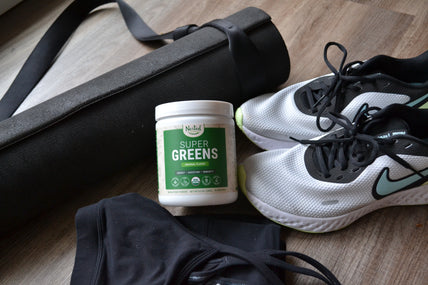Is Fish Oil A Sustainable Option?

So, what exactly is the deal with fish oil?
Commonly marketed under the moniker “Omega-3 fatty acids”, fish oil is currently one of the trendiest supplements out there. It’s the third-largest supplement sold in the US, and has become a $34 billion-a-year global industry.
With many health benefits, people use fish oil to help with everything from heart disease and strokes to asthma and ADHD – but not many realize just how much impact making these costly little yellow pills can have on the environment and the fishing industry.
Why do we need Omega-3?
There are three main omega-3 fatty acids: Eicosapentaenoic acid (EPA), docosahexaenoic acid (DHA), and alpha-linolenic acid (ALA).
ALA is essential as it cannot be made in the body, and therefore needs to be obtained through our diet. It’s mostly found in plant sources such as flax seeds, and can also be converted into EPA and DHA in the body. (Unfortunately, this conversion often doesn’t work well, making ALA a questionable source for EPA and DHA omega-3s.)
Most fish oil supplements contain EPA and DHA, which are the omega-3s that are considered the most important for therapeutic benefits.
Omega-3 fatty acids are pretty awesome—they have been shown to reduce inflammation and may help lower risk of chronic diseases such as heart disease and arthritis. High concentrations of Omega-3 fatty acids are found in the brain and appear to have a role in memory, cognition and mood!
According to the National Institutes of Health (NIH), Omega-3s provide the following benefits to our health:
- Reduces pain and swelling
- May help prevent and treat depression/anxiety
- Improves eye health
- Crucial for brain growth and development during pregnancy and early life
- Helps lower the risk of heart diseases, cancer and arthritis
- Reduces symptoms of ADHD
- May lower the risk of asthma
- Improves bone and joint health
Sustainability and Fishing
While we may have an endless demand for fish oil, unfortunately, we don’t have an endless supply of fish. Using fish for their oil is not sustainable, and has a major impact on our oceans and marine wildlife.
There are a few important reasons why many people choose not to take dietary supplements made from fish oil:
1. Environmental impact/overfishing

If current overfishing and pollution patterns continue, we can expect to see a total collapse of world fish populations by 2048.
Most of the fish that are used to create fish oil products in the US are oily fish like salmon, mackerel, and forage fish like menhaden and sardines.
Forage fish in particular are some of the most important species in ocean food webs, as they are a vital food source for many marine animals – including whales, dolphins, seabirds and other fish that people eat (such as grouper, snapper and salmon).
They’re also key ingredients in products like fertilizer, cosmetics, and fishmeal for aquaculture and fish feed, and play an important role in keeping the oceans clean. An adult menhaden can rid 4-6 gallons of water of algae in a minute!
In certain parts of the world, forage fish populations have plummeted due to overfishing. Studies from the Food and Agriculture Organization (FAO) have shown that global fisheries are currently at a tipping point. If current overfishing and pollution patterns continue, we can expect to see a total collapse of world fish populations by 2048 (and according to the UN, over 70% of the world’s fish are already either depleted or fully exploited).
2. Contaminants
Over the last 20 years, the ocean’s mercury levels have risen by about 30%.
Fish can accumulate toxins from water pollution, such as mercury, dioxins and polychlorinated biphenyls (PCBs), which can then get passed to people through consumption of fish/fish products (including fish oil, unless your supplements go through a strict decontamination process).
Our Solution: Algal Oil
It’s the new vegan kid in town, and it may be the answer to every Omega-3 supplement-seeker’s problems – allowing you to get the Omega-3 levels you need, without the fish.
What’s great about algal oil?
Fish don’t produce Omega-3 by themselves any more than humans do – they get it from eating algae that contains a plant-based type of Omega-3. Fish are the the middleman in the whole process.
Researchers figured out that instead of going through our fishy friends for Omega-3, we could go directly to the source – the algae, which is naturally-rich in EPA and DHA (and which is why our supplement has it, too!)
This marine algae can be produced sustainably on farms, and is vegetarian/vegan, kosher and organic. Best of all, it enables you to get enough Omega-3s in your diet in a sustainable and humane way.
Does algal oil have the same benefits?
Just like fish oil, the vegan Omega-3 made from algal oil boasts the same benefits. Some notable benefits of supplementing with a vegan algal oil supplement include:
Eye Health - DHA is necessary for healthy eyes - you can find DHA in high concentrations in your retinas. The American Optometric Association suggests a daily intake of Omega-3 to support and maintain eye health.
Cardiovascular Support - Supportive but not conclusive research shows that consumption of EPA and DHA omega-3 fatty acids may reduce the risk of coronary heart disease.
Brain Booster - Omega-3 fatty acids, and especially DHA, may play a supportive role in memory and cognitive health. In addition, maintaining healthy levels of DHA may help to support a positive mood.
How much Vegan Omega-3 should I take?
International Society for the Study of Fatty Acids and Lipids recommends that adults get 500 mg of Omega-3 fatty acids daily. As always, we recommend consulting with your doctor about your body’s specific nutritional needs.
Conclusion
Whether you’re not a fan of fish, or have chosen to follow a plant-based diet, you’ll definitely want to consider algal oil as a sustainable and effective option for you to get the Omega-3 fatty acids that you need.
Sources:
National Geographic
Tree Hugger
Choice



